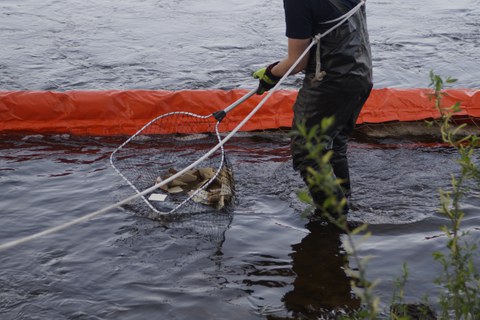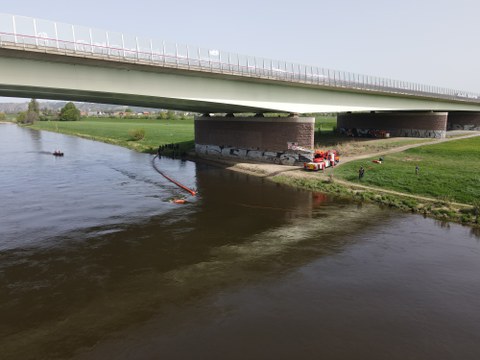Apr 18, 2024
Sustainable innovation: Wood fiber-based oil binders from TU Dresden tested on the Elbe river
Researchers at TU Dresden (TUD) have developed oil binders based on wood fibers to effectively combat oil spills and accidents at sea and in stagnant waters. The small wood fiber palettes developed in the "Biobind" joint project by the Chair of Wood Technology and Fiber Materials Technology have now also been tested on the Elbe river.
The small oil-binding palettes are made of renewable, biodegradable wood fibers that absorb oil very quickly and effectively. The material absorbs oil without soaking up water. Until now, fire departments have used skimmer systems to suck the oil from the surface or used oil binders in powder form. These agents may either not be used in shallow bank areas or cannot be removed from the water. In addition, these agents are unsuitable for higher flow velocities. Therefore, the invention represents an environmentally friendly and swiftly deployable alternative to conventional methods.
The oil binders were further developed into an industrial product in cooperation with Katz GmbH from Weisenbach in the Black Forest and tested for the first time on a large body of water with the trial on the Elbe in Dresden. During an oil spill drill, the Dresden fire department and TUD researchers trained how to deploy and remove the small wood fiber palettes from the river. No oil was used during the fire drill. In contrast to previous tests on inland waters, the strong current in flowing water poses a particular challenge. For this reason, the firefighters worked with a flexible oil barrier. The oil binders were dropped from a boat into the Elbe. By placing the oil barrier at an angle, the binders were driven to shore, where they were extracted from the water. In case of emergency and in hard-to-reach areas, the small wood fiber palettes could also be coated with a layer of oil-eating microbes so that they decompose naturally, if lost.
However, this innovation is not only envisaged for use on water in the future: "We are currently in the process of developing the small wood fiber palettes for other areas of application on land and on road surfaces. In industry, wood fiber-based absorber mats could replace plastic mats in the assembly of engines and gearboxes. We are currently testing the material for its ability to absorb engine oil, transmission fluid, brake fluid, coolant and Adblue," explains inventor and project developer Holger Unbehaun about further research activities.
Although it is already an environmentally friendly and tested material, the scientists are also researching the use of by-products containing fibers: "We are investigating the extent to which local agricultural residues, such as palm wood, bagasse or rice straw, are suitable for oil binders in order to then transfer this method to particularly endangered but deforested regions," adds Unbehaun.
Contact:
Holger Unbehaun
Chair of Wood Technology and Fiber Materials Technology
+49 351 463-38109


